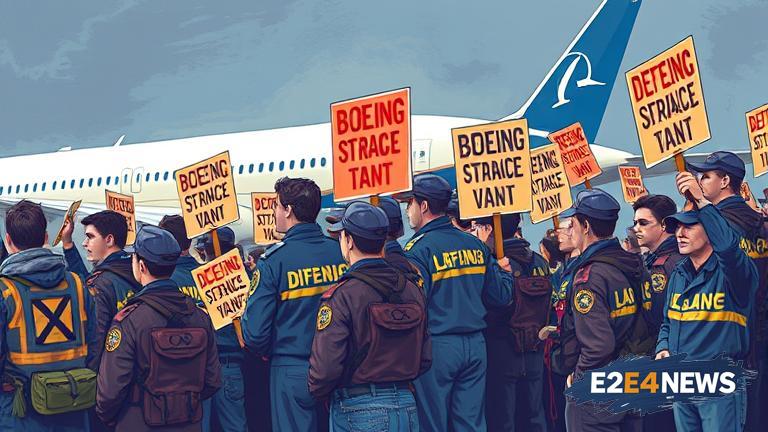A labor dispute has led to a strike by workers at Boeing’s defense division, specifically those involved in the assembly of jets and missiles. The strike, which began recently, is a result of disagreements over contract terms between the workers’ union and Boeing management. The workers, represented by the International Association of Machinists and Aerospace Workers (IAM), are seeking better wages, benefits, and working conditions. Boeing, on the other hand, is looking to reduce costs and increase efficiency in its defense division. The strike affects several Boeing facilities across the United States, including those in St. Louis, Missouri, and Mesa, Arizona. The workers on strike are responsible for assembling some of the company’s most advanced defense systems, including the F-15 and F/A-18 fighter jets. The strike has significant implications for the US military, which relies heavily on Boeing for its defense needs. The company has stated that it is committed to finding a resolution to the dispute, but the union has expressed frustration over the lack of progress in negotiations. The strike is the latest in a series of labor disputes to affect the aerospace industry in recent years. Boeing has faced criticism for its handling of labor relations, with some accusing the company of prioritizing profits over worker welfare. The strike has also raised concerns about the impact on the US economy, particularly in regions where Boeing has a significant presence. The IAM has stated that it will continue to negotiate with Boeing in good faith, but will not back down on its demands for fair treatment of workers. The strike has received support from other labor unions and worker advocacy groups, who see it as a crucial test of the power of organized labor in the US. Boeing’s defense division is a significant contributor to the company’s overall revenue, and the strike has the potential to impact the company’s bottom line. The US military has expressed concern over the potential disruption to its supply chain, but has stated that it is working closely with Boeing to minimize the impact. The strike is a reminder of the ongoing tensions between labor and management in the US, particularly in industries where workers are highly skilled and in demand. As the strike continues, attention will be focused on the negotiations between Boeing and the IAM, with many watching to see how the dispute will be resolved. The outcome of the strike will have significant implications for the future of labor relations in the aerospace industry, and could set a precedent for other worker disputes in the US. The strike is also a reminder of the importance of fair labor practices and the need for companies to prioritize worker welfare. Boeing has faced criticism for its handling of labor relations in the past, and the strike is an opportunity for the company to demonstrate its commitment to treating workers fairly. The IAM has stated that it will continue to fight for the rights of its members, and the strike is a key part of that effort. As the situation continues to unfold, it remains to be seen how the dispute will be resolved, but one thing is clear: the strike has significant implications for Boeing, the US military, and the broader labor movement.





